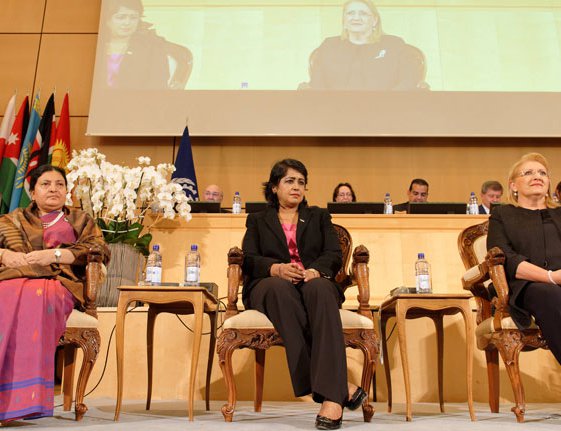
President Bidya Devi Bhandari has said the decent work agenda promoted by International Labor Organization constitutes a key pillar of fair globalization where everyone becomes a winner, adding this goal can be achieved if every State accords due regard to the dignity and value of work.
Addressing the 106th Session of the International Labor Conference in Geneva on Thursday, President Bhandari, said we should create an environment for sharing best practices and promoting innovative ideas to make work more dignified.
According to a press release issued by ILO, Three women presidents addressed the Summit including president Bhandari from Nepal.
The President of Malta, Marie-Louise Coleiro Preca , rejoined the arguments of the head of the ILO and called on the global community to take urgent action on gender equality.
“The global economy will continue to suffer greatly, if women continue to be excluded,” Marie-Louise Coleiro Preca said at the ILO’s World of Work Summit.
She called on the international community to take urgent action “to accelerate gender equality and equitable participation in the economy”.
“Gender inequality is not only a pressing issue of moral significance. It is a challenge of critical importance to our economies,” the Maltese President told delegates.
Another distinguished guest, Nepal’s President Bidya Devi Bhandari , urged women’s empowerment to promote equal, just and peaceful societies.
“Societies cannot stand a long time on the shaky foundation of discrimination and inequality. Discrimination against women must come to an end for which we all have to put our meaningful efforts,” said President Bidya Devi Bhandari.
“It’s a fact that without political, economic, social and cultural empowerment of women, we cannot imagine the establishment of an equal, just and peaceful society,” she said.
Nepal’s President was joined by the President of Mauritius, Ameenah Gurib-Fakim who also advocated a better future for women at work.
The first woman President to lead Mauritius, urged African Member States to eliminate gender inequality and empower women to boost the continent’s development potential through innovative policies that facilitate women’s integration in the workforce.
“Eliminating gender inequality and empowering women could raise the productive potential of one billion Africans, delivering a huge boost to the continent’s development potential,” said Gurib-Fakim in her first address to the International Labour Conference.
A recent ILO-Gallup report , based on a survey of 142 countries and territories, shows that women want to work in paid jobs but there remains a significant gap between women’s aspirations and the labour market reality.
The three President’s remarks followed a High-Level Panel discussion on how to shape a better future for women at work.
The panel addressed the main challenges women face in obtaining decent work, and what is needed to overcome such obstacles. Panelists (LINK) included representatives of governments and civil society from ILO member States.
“If women are invisible because they are not seeing as equal and their work are not valued, then it is a crime against humanity,” said Sharan Burrow, General Secretary, International Trade Union Confederation (ITUC).
ILO’s Decent Work Agenda Key Pillar of Fair Globalization: President Bhandari
President Bidya Devi Bhandari has said the decent work agenda promoted by International Labour Organization constitutes a key pillar of fair globalization where everyone becomes a winner, adding this goal can be achieved if every State accords due regard to the dignity and value of work.
Addressing the 106th Session of the International Labor Conference in Geneva on Thursday, President Bhandari, said we should create an environment for sharing best practices and promoting innovative ideas to make work more dignified.
The President, reminding that the world leaders adopted an ambitious 2030 Agenda for Sustainable Development in the year 2015, said it was a matter of satisfaction that all pillars of the Decent Work Agenda were duly integrated in the 2030 Agenda. It has also rightly identified gender equality both as an objective as well as a means for realizing the goals, she hailed.
According to her, the role trade unions play for the maintenance of harmonious industrial relations and peace ultimately contributes to the economic development and prosperity of society at large. We do acknowledge the role of trade unions in our national advancement too.
“As ILO approaches its 100th anniversary in 2019, I commend it for making ‘Women at Work’ as one of the centenary initiatives. My sincere appreciation goes to the entire membership of ILO for electing Nepal in the Governing Board during the current session,” she said.
Moreover, the President said compared to situation few decades ago, women are more educated and trained now; they have better access to labour market; they represent in increasing number in parliaments; and have more leadership role in governments and enterprises. But the goal towards realising full gender equality is yet to be achieved.
Unique World Work Summit
The International Labour Organization (ILO) held a unique World of Work Summit here to shape a better future for women at work. The unique format of the event included the visit of three women Presidents and a high-level panel discussion bringing together the social partners and civil society representatives.
“As we work towards our next centenary and the transformations in the world of work intensify, a renewed sense of commitment is needed today to ensure that this better future for women – and men – becomes a reality,” ILO Director-General told the ILO’s world parliament of labour in his introductory remarks.
“We have to take it as a starting point that equality for women in the workplace will not happen unless bold choices are made, and courageous measures are taken. Women want to be in paid jobs, and these must be decent jobs – not undervalued, not taking place in an environment of discrimination, harassment or violence,” Ryder said.
According to ILO Press release, the head of the ILO also highlighted the economic benefits of such an approach.
“The ILO report released yesterday, on trends for women, shows that applying the G20 “25 by 25” target – namely reducing the gender gaps in labour market participation by 25 per cent by the year 2025 – to all countries, could increase the global labour force by 204 million, and in turn could increase global GDP by 3.9 per cent. These are figures that cannot be ignored.”
The report, World Employment and Social Outlook (WESO) – Trends for Women 2017 , estimates that if this goal was realized at the global level, it has the potential to add US$ 5.8 trillion to the global economy and increase tax revenue by US$ 1.5 trillion.
- TANAHU HYDROPOWER PROEJCT: A Significant Achievement
- Apr 15, 2024
- AMBASSADOR HANAN GODAR: Sharing Pain With A Nepali Family
- Mar 30, 2024
- VISIT OF KfW AND EIB TO NEPAL : Mission Matters
- Mar 25, 2024
- NEPAL BRITAIN SOCIETY: Pratima Pande's Leadership
- Mar 24, 2024
- NEPAL ARMY DAY: Time To Recall Glory
- Mar 15, 2024
















